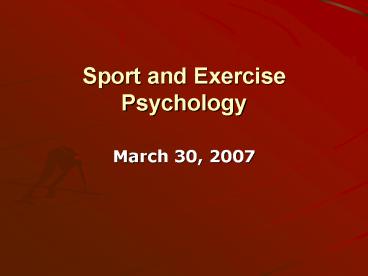Sport and Exercise Psychology - PowerPoint PPT Presentation
1 / 15
Title:
Sport and Exercise Psychology
Description:
Fitness industry. Sports medicine or PT clinic ... AAASP certification. Association for the Advancement of Applied Sport Psychology ... – PowerPoint PPT presentation
Number of Views:202
Avg rating:3.0/5.0
Title: Sport and Exercise Psychology
1
Sport and Exercise Psychology
- March 30, 2007
2
What is sport and exercise psychology?
- The scientific study of the behavior of people
engaged in sport and exercise activities and the
application of the knowledge gained (Gill, 2000).
3
Why study sport and exercise psychology?
- 1. to understand how psychological factors affect
a persons motor performance. - How does anxiety affect a b-ball players
accuracy in free-throw shooting? - Does lacking self-confidence influence a childs
ability to learn to swim? - How do a coachs reinforcement and punishment
influence a teams cohesion? - Does imagery training facilitate recovery in
injured athletes and exercisers?
4
Why study sport and exercise psychology?
- 2. to understand how participating in physical
activity affects a persons psychological
development. - Does running reduce anxiety and depression?
- Do young athletes learn to be overly aggressive
from participating in youth sport? - Does participation in daily physical education
classes improve a childs self-esteem. - Does participation in college athletics enhance
personality development?
5
Who do sport and exercise psychologists work with?
- Elite athletes
- Children
- Persons who are physically or mentally disabled
- Seniors
- Average participants
- Goal to achieve maximum participation, peak
performance, personal satisfaction, and
development through participation.
6
What roles do sport and exercisepsychologists
play?
- Research Role
- Advance knowledge within the field
- Motivation and children and youth sport
- Imagery influences on golf putting
- Running program and anxiety reduction
- Share findings with colleagues and participants
in the field. - Allows for advances, discussion, and debate at
professional meetings and in journals.
7
What roles do sport and exercisepsychologists
play?
- Teaching Role
- Teach university courses
- Exercise Psychology
- Applied Sport Psychology
- Social Psychology of Sport
- Personality Psychology
- Developmental Psychology
- Motor Learning and Control
- Sport Sociology
8
What roles do sport and exercisepsychologists
play?
- Consulting Role
- Individuals or teams
- Develop psychological skills to enhance
performance and training. - U.S. Olympic Committee
- Major universities to small colleges
- Coaching clinics and workshops
- Fitness industry
- Sports medicine or PT clinic
9
What do I need to do to become a certified
consultant?
- AAASP certification
- Association for the Advancement of Applied Sport
Psychology - www.aaasponline.org
- Advanced coursework in psychology and sport
sciences - 400 hours of supervised consultation
10
What topics would I work with athletes/exercisers
on?
- Personality
- Motivation
- Arousal/Anxiety
- Team Dynamics
- Group Cohesion
- Leadership
- Communication
- Imagery
- Self-Confidence
- Goal Setting
- Concentration
- Exercise Adherence
- Athletic Injuries
- Addictions
- Burnout
- Youth Sport
- Aggression
- Character Development
11
What type of sport and exercise psychology suits
you?
- Clinical sport psychologists
- extensive psychology training
- treat athletes and exercisers with emotional
disorders (severe depression, suicidal
tendencies, eating disorders, substance abuse,
etc.) - licensed by state boards to treat emotional
disorders - also have training in sport psychology and sport
sciences
12
(No Transcript)
13
What type of sport and exercise psychology suits
you?
- Educational sport psychology specialist
- extensive training in sport and exercise science,
PE, kinesiology and the psychology of movement. - advanced training in psychology/counseling
- NOT licensed psychologists
- mental coach
14
Whats new?
- Growing interest in acquiring training in
psychological skills/applied work. - Greater emphasis on counseling and clinical
training. - Ethics and competence issues are hot issues.
- Specializations and subspecialties are developing
(Exercise psych and life skills development
through sport) - Tension between academic versus applied sport
psychologists.
15
Whats new?
- Qualitative research is on the rise.
- Applied sport psychology opportunities on the
rise part-time - Sport psychology is being recognized as very
useful for more than just athletes (PE, coaches,
fitness, AT) - Sport psychology is a form of positive psychology
(business, artists, dancers, musicians, surgeons)































